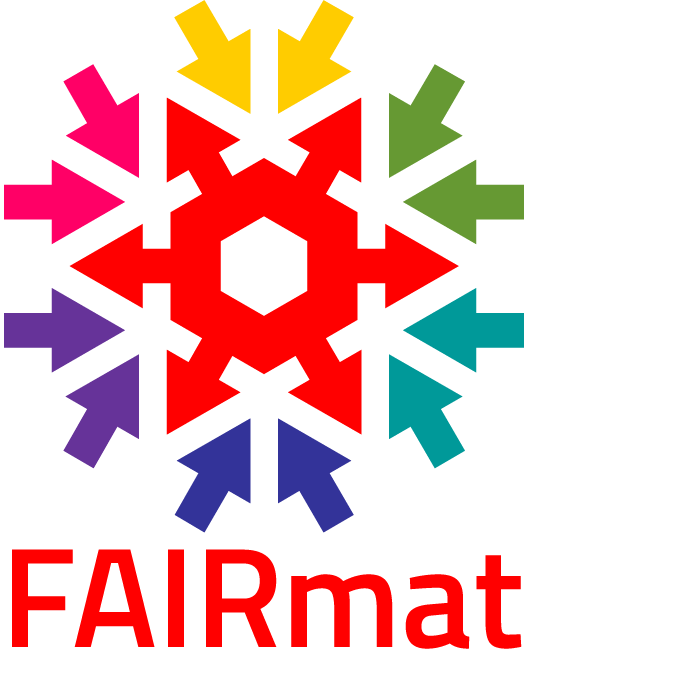Speaker: Claudia Draxl (Humboldt-Universität zu Berlin)
Deputy Speaker: Christoph Koch (Humboldt-Universität zu Berlin)
Jump to: Mission | Our Approach | The FAIRmat community
Mission
We provide scientists with a FAIR data infrastructure and the skills and tools they need to make the most of it. Our mission has two parts:
1. Develop and maintain a federated FAIR data infrastructure for materials data with built-in tools and standards to support scientific collaboration and proper research data management (RDM) practices.
2. Support the scientific community to introduce and maintain high standards of reproducibility, research integrity, and compliance with ethical and legal requirements by adopting proper RDM practices based on the FAIR data principles.
Our values
FAIR data infrastructure for materials science
Scientific data are a significant raw material of the 21st century, but the current research publication system and data infrastructures are not set up to promote easy access to and use of these data. To really exploit their value, a FAIR data infrastructure (DI) is a must.
For the wider field of condensed-matter physics and the chemical physics of solids, FAIRmat sets out to make this happen. By integrating synthesis, experiment, theory, computations, and applications, we will substantially further the basic physical sciences, reaching out to chemistry, engineering, industry, and society.
FAIRmat is funded as a consortium of the German Research-Data Infrastructure NFDI.
Why are FAIRmat’s research data so important?
Simply speaking, the prosperity and lifestyle of our society are very much governed by achievements of this field as new products from the energy, environment, health, mobility, IT sectors, etc. very much rely on improved or even novel materials. Examples include solid-state lighting, touch screens, batteries, implants, and many more. Boosted by the US Materials Genome Initiative (MGI), an enormous amount of data on materials (from basic and applied science and engineering) has been produced in recent years. These data are largely kept on local servers, but their characterization is typically incomplete. Without an efficient DI, the data are neither easily accessible nor re-usable.
Our Approach
- Create a federated FAIR DI for materials data with a central hub, the FAIRmat Portal.
- Advance and develop metadata schemas and ontologies.
- Enable efficient exchange of the FAIR research data, ensuring that the FAIRmat DI will advance basic science of condensed-matter and materials physics by supporting active researchers, and also be of great value for engineering.
- Convince scientists to also share data they consider useless for their present purpose-oriented research.
- Reach out within and beyond the community providing advice, training, and user support.
The FAIRmat Community
... in Germany
FAIRmat represents a broad community of researchers from universities and other leading institutions in Germany. The project aims at covering the full breadth of the Condensed Matter Section of the German Physical Society (DPG) with its 12 divisions, and is further supported by the Chemistry, Physics, and Technology Section of the Max Planck Society, the Bunsen Society for Physical Chemistry, and many more.
... and abroad
FAIRmat is fully embedded internationally, e.g., in the Research Data Alliance, the European Open Science Cloud, GO FAIR, etc. and has signed Memoranda of Understanding with leading institutions worldwide, including NIST (USA), Shanghai University (China), and CSC (Finland). FAIRmat will continue to raise awareness and appreciation of a FAIR research-data infrastructure in Germany, Europe, and beyond.
FAIRmat's connection to the NOMAD Lab and FAIR-DI e.V.
FAIRmat builds on extensive experience with the worldwide biggest data infrastructure in computational materials science, the Novel Materials Discovery (NOMAD) Laboratory and develops it further.
The association FAIR-DI e.V. was founded to foster an international and FAIR research data infrastructure for big data from materials science, engineering, and astronomy. Its German members are represented in FAIRmat, advocating the interests of experimental and theoretical condensed-matter and chemical physics in the development of the NFDI.
The NOMAD Laboratory offers cutting-edge tools for collecting, storing, presenting, and analyzing materials-science data to the international community. FAIRmat operates the NOMAD Laboratory, develops it further and widens its scope to include experiment and sample synthesis data. Get more details here.
Join the FAIRmat community
FAIRmat will continue to raise awareness and acceptance of a FAIR research-data infrastructure in Germany, Europe, and beyond. Join our community!
